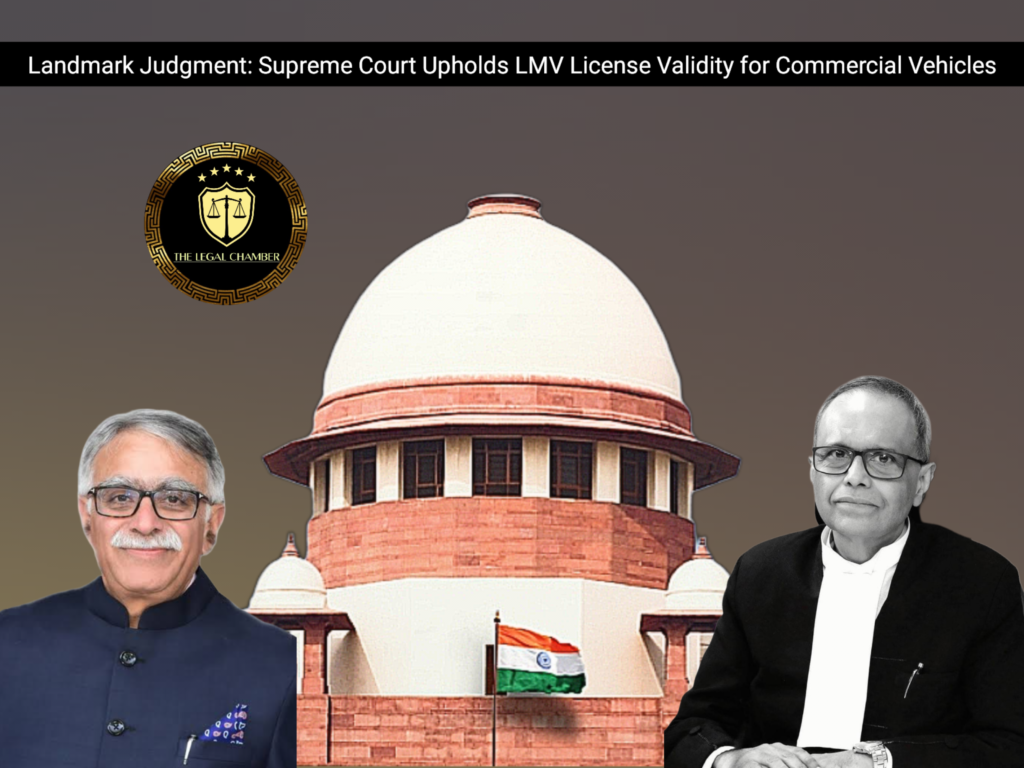
The Supreme Court held that a driver with a Light Motor Vehicle (LMV) license can operate a commercial vehicle (gross weight ≤7500 kg) without additional endorsement, affirming Mukund Dewangan. However, the Insurance Company was liable under the “Pay and Recover” principle despite the “Liability Only Policy” excluding gratuitous passengers, citing Baljit Kaur and Pranay Sethi. Compensation was enhanced by 10% under conventional heads.
Facts Of The Case:
On 27th November 2013, Gokul Prasad, a 32-year-old cloth seller, died in an accident involving a TATA 407 truck (registration No. M.P. 53G/0386) near Kurwaiha Ghati Road. The truck, driven rashly and negligently by Respondent No. 3, was returning from a weekly market. The deceased’s legal representatives (Appellants) filed a claim under Section 166 of the Motor Vehicles Act, 1988, seeking Rs. 49,26,000/- as compensation, alleging his monthly income was Rs. 12,000/-. The Respondent Insurance Company denied liability, citing breach of policy conditions—the truck lacked a valid permit, fitness certificate, and the driver held only an LMV license, not a commercial vehicle endorsement. The Motor Accident Claims Tribunal awarded Rs. 19,53,000/- with 6% interest, holding the driver and owner jointly liable due to policy violations. The High Court upheld this, exonerating the insurer. The Supreme Court, however, ruled that an LMV license sufficed for the truck (weight <7500 kg), following Mukund Dewangan. Though the “Liability Only Policy” excluded gratuitous passengers, the Court applied the “Pay and Recover” principle, directing the insurer to compensate the Appellants (Rs. 26,97,500/- after a 10% enhancement) and later recover the amount from the owner. The driver was absolved as his license was valid.
Procedural History:
The case originated with a claim petition filed by the legal heirs of Gokul Prasad before the Motor Accident Claims Tribunal (MACT), District Seedhi, under Section 166 of the Motor Vehicles Act, 1988. The Tribunal awarded compensation of Rs. 19,53,000/- with 6% interest, holding the driver and owner jointly liable while exonerating the Insurance Company due to policy violations. The owner appealed to the High Court of Madhya Pradesh at Jabalpur, which upheld the Tribunal’s decision, affirming that the insurer was not liable under the “Liability Only Policy.” Dissatisfied, the claimants approached the Supreme Court via a special leave petition. The Supreme Court modified the lower courts’ orders, ruling that the driver’s LMV license was valid for the commercial vehicle involved and invoking the “Pay and Recover” principle against the insurer. It enhanced compensation to Rs. 26,97,500/- with 6% interest, directing the insurer to pay and later recover the amount from the vehicle owner. The Supreme Court’s judgment thus overturned the High Court’s exoneration of the insurer while partially upholding the Tribunal’s findings on liability.
READ ALSO :Supreme Court : Key NDPS Ruling Courts Can Impose Harsher Sentences Without Specific Reasons
Court Observation:
The Supreme Court made several key observations in its judgment. Firstly, it reaffirmed the legal principle established in Mukund Dewangan that a Light Motor Vehicle (LMV) license is sufficient to drive a commercial vehicle with a gross weight not exceeding 7500 kg, eliminating the need for a separate endorsement. The Court emphasized that the driver in this case was legally authorized to operate the TATA 407 truck involved in the accident. Secondly, the Court acknowledged that the Insurance Company’s “Liability Only Policy” did not cover gratuitous passengers, as no premium had been paid for such risk. However, it invoked the doctrine of “Pay and Recover,” directing the insurer to first compensate the claimants and later recover the amount from the vehicle owner, citing precedents like Baljit Kaur and Pranay Sethi. Additionally, the Court enhanced the compensation by 10% under conventional heads, aligning with inflationary trends and ensuring just reparation for the victim’s family. The judgment balanced statutory compliance with equitable relief, ensuring that technical breaches by the insured did not deprive the claimants of timely compensation.
Final Decision & Judgement:
The Supreme Court allowed the appeal, modifying the decisions of the Tribunal and High Court. It held that the Insurance Company must pay the enhanced compensation of ₹26,97,500/- with 6% interest to the claimants under the “Pay and Recover” principle, despite the “Liability Only Policy” excluding gratuitous passengers. The insurer was granted the right to recover this amount from the vehicle owner subsequently. The Court affirmed that the driver’s LMV license was valid for the commercial vehicle in question, absolving him of liability. The compensation was recalculated with a 10% increase under conventional heads (loss of estate, consortium, and funeral expenses) in line with Pranay Sethi. The awarded amount was directed to be remitted to the claimants’ bank account within four weeks. The judgment reinforced the insurer’s statutory obligation to third parties while protecting its contractual rights against policy breaches by the insured.
Case Details:
Case Title: Sunita & Ors. vs. United India Insurance Co. Ltd. & Ors. Citation: 2025 INSC 867 Appeal No.: Civil Appeal No. 9538 of 2025 Date of Judgment: 17th July 2025 Judges/Justice Name: Justice Sanjay Karol & Justice Joymalya Bagchi
Download The Judgement Here